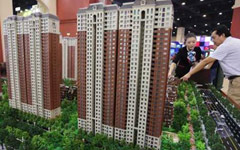BEIJING - Despite a rush to buy property in China, Huang Dandan, a white-collar worker who has worked in north China's Tianjin Municipality for one year, decided to sit tight.
"After the government announced its easing policy, property has once again become a hot topic. But the house-price trend is still unclear, so I decide to wait and see," Huang said.
 |
| Lending rule easing to boost property sales |
 |
| China eases home purchase restriction |
On Sept 30, eased mortgage measures were jointly announcement by the People's Bank of China, the central bank, and the China Banking Regulatory Commission, in response to a slowdown in the property market since the beginning of the year.
According to the announcement, mortgages on second homes will be treated as a first one provided the buyer has no other outstanding mortgages. In addition, interest rates will be slashed to as low as 70 percent of the 6.55-percent benchmark mortgage rate, instead of the 10-percent premium on top of the benchmark rate as previously required.
Data from the China Index Academy reveals that from Oct 19 to 25, residential property sales in most of the 21 monitored first- and second-tier cities rose, with growth in Beijing and Shenzhen hitting 17.78 percent and 36.13 percent, respectively, compared with last month.
"Demand in the real estate market saw steady growth last month since the launch of the new policy," said Li Xinlong, account manager at the Changchun branch of WorldUnion Properties.
"However, most potential buyers haven't taken any action yet," Li added.
According to the statistics from Rong360.com, a financial information provider, only 34.91 percent of the 400 banks in China's 23 first- and second-tier cities have adopted the new mortgage measures introduced by the central bank, with a mere 30.47 percent having lowered mortgage rates to first-time homebuyers.
"Banks can only offer 5- to 10-percent discounts on mortgage interest rates to first-time homebuyers," said an account manager with the Tianjin branch of the China Construction Bank. "The 30 percent discount is hard to realize. It will be a losing position for banks."
This opinion was echoed by Xu Jin, an expert with Rong360 Credit.
"A mortgage rate of 10 percent, which still leaves banks room to benefit, could be the bottom line," said Xu, adding that the banking authorities might even raise lending bars to maintain profits.
Despite reluctant banks and cautious investors, the government has signaled determination to stabilize the property market.
During a State Council meeting in late October, Premier Li Keqiang vowed to stabilize housing consumption, improve affordable housing projects and relax lending rules, indicating that the government is loosening its grip on property market policies, which would benefit those wishing to buy houses of their own.
The unwinding of property control is aimed at curtailing government interference and boosting domestic demand, according to Qi Ji, deputy head of the Ministry of Housing and Urban-rural Development.
Wang Xiaoguang, a policy-making expert with the Chinese Academy of Governance, said that amid lowering fixed-asset investment, meeting domestic demand was the future trend.
The easing of home purchasing restrictions and mortgage rate reductions will stoke growth in a sagging sector, said Frank Chen, research head of commercial real estate services company CBRE Greater China.
"With a rush to sell inventories of unsold homes and government efforts, the property sector may become more stabilized," Chen said.
